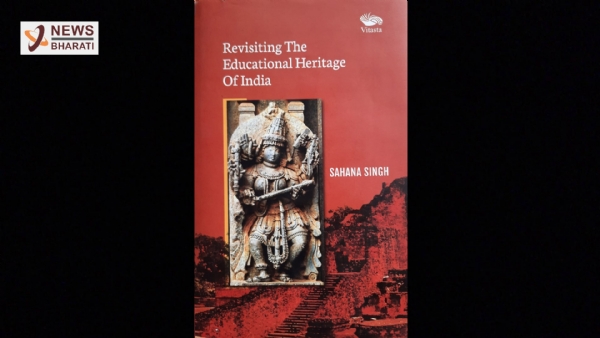Book Review – Revisiting Educational Heritage of India
The book “Revisiting the Educational Heritage of India” by Sahana Singh filled up a huge gap in information about our educational heritage which was destroyed first by ignorant, violent hoards from Middle East and later killed skilfully by the British who understood its power and need to colonise the minds of the natives.
Total Views |
I won’t call it book review because it is not a critique. It is appreciation for a book that was long needed, specially for anyone connected with education in India and wished to know about Bharatiya education system. Though everyone talks about it, except Dharampal ji’s work on Indian education in 18th and 19th Century, there is no easy-to-read information in a book form. There are scholarly works and there are self-laudatory works. I apologise in advance if there are books that I am not aware about as I am not an academic.
 Tragedy is that our rulers who took over after independence from the British simply trashed our heritage without even bothering to have them studied by scholars who were available in large numbers at that time, nor were they ready to know about them, forget about using them. The blind copying of colonial masters’ institutions and methods has led to highly colonised minds that dictate our public policies including education policies, which is what Macaulay had clearly outlined while enunciating his new education policy.
Tragedy is that our rulers who took over after independence from the British simply trashed our heritage without even bothering to have them studied by scholars who were available in large numbers at that time, nor were they ready to know about them, forget about using them. The blind copying of colonial masters’ institutions and methods has led to highly colonised minds that dictate our public policies including education policies, which is what Macaulay had clearly outlined while enunciating his new education policy.
The book “Revisiting the Educational Heritage of India” by Sahana Singh filled up a huge gap in information about our educational heritage which was destroyed first by ignorant, violent hoards from Middle East and later killed skilfully by the British who understood its power and need to colonise the minds of the natives. They achieved what Islamic invaders could not. Because they destroyed the libraries and killed acharyas but couldn’t kill the spirit of seeking and urge to preserve and nurture our knowledge systems that had made Bharat number one educational hub and global economic power.

I have heard about our knowledge systems, attended wonderful lectures and felt awestruck at our ancestor’s intellect, their selfless readiness to spread the knowledge globally. But, the first glimpse I got was while writing my first book ‘Secrets of RSS’ when I came across the great Gandhian Dharampal’s work. I wondered why his books never became mainstream despite his copious use of unchallengeable British documents. Why the books were never reprinted after the initial copies were exhausted. I noted in my biography of the fourth RSS Sarsanghchaalak Prof Rajendra Singh aka Rajju bhaiyya who was a celebrated professor of Allahabad University, talked about his works and tried to get original books and tried to see their widespread use. But he faced the problem I have noted here.
This is why Sahana Singh’s book is worth its weight in gold. She has gone much beyond what Dharampal ji wrote. She has taken a holistic view of the educational heritage of Bharat and covered every possible dimension in the limited pages of her book. It is very easy to read book that has enormous references to back up her claims about our education systems – both Indian as also overseas. Readers can get an idea about the scope of the book by mere mention of the headings of different sections of the book –
- A civilisation defined by education
- The land of universities
- The institutionalisation of education
- Women and education
- Memory training: An essential component
- Celibacy: Control of senses in the pursuit of knowledge
- Education through games
- Distilling worldly wisdom through fables
- Nuances of Learning
- Translations that powered a knowledge revolution
- Lethal assault on learning
- The curse of colonialism
- What can today’s India learn from her ancient systems
I was most fascinated by the chapters on descriptions of various universities, women, memory training, education through games and fables and export of knowledge through translations and travels of scholars world over. Chapters on the assault on our knowledge systems are, of course, painful.
I congratulate Vitasta for publishing this wonderful book that opens up our minds. Sahana Singh writes as an objective scholar, avoiding emotions or hype while sharing her research in simple language. This book should be an essential reading for every person connected to education field. It is an excellent reading for others who wish to know why some ‘orthodox’ ‘anachronist’ people keep talking about Gurukuls and need to go back to our proven ancient education system.

